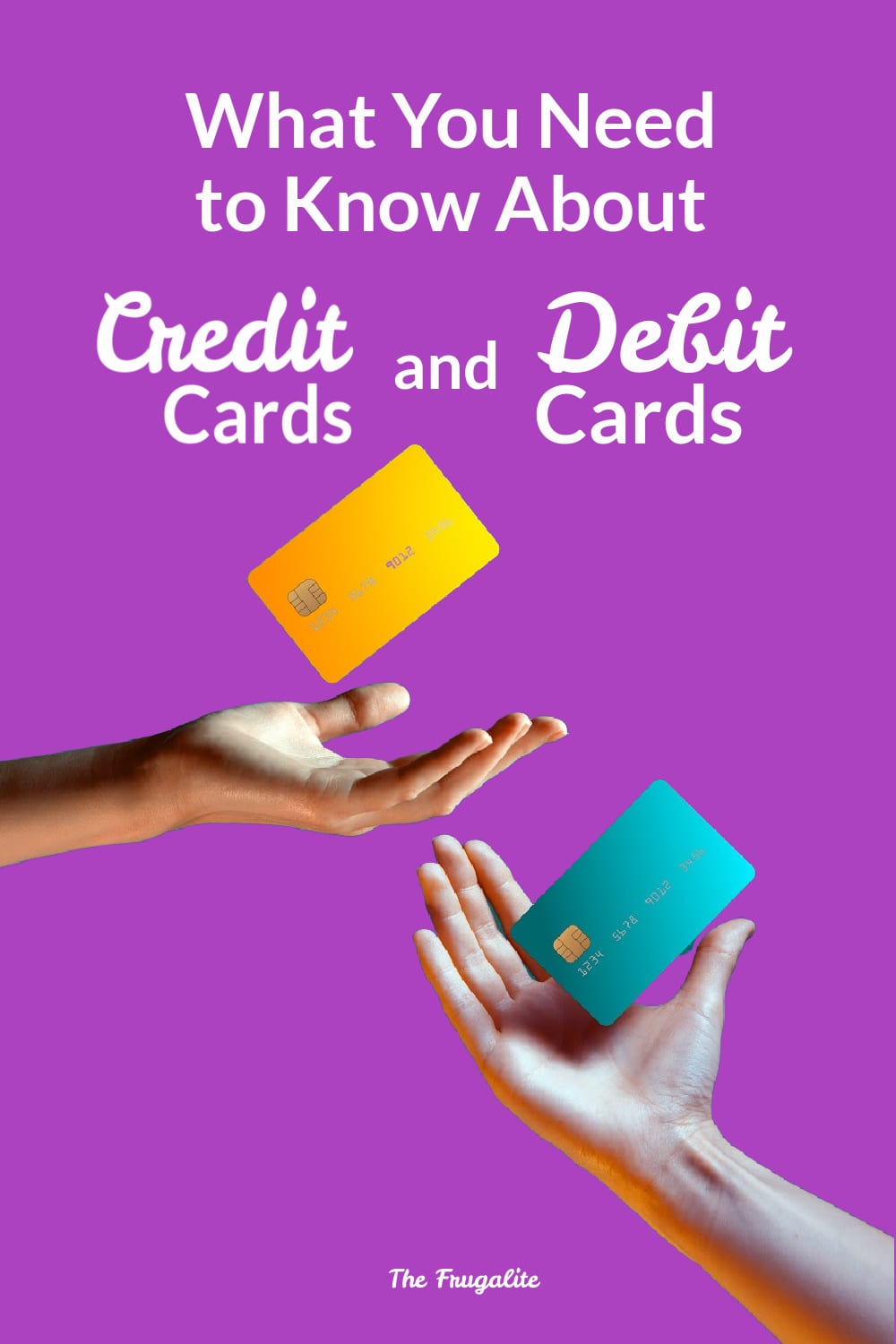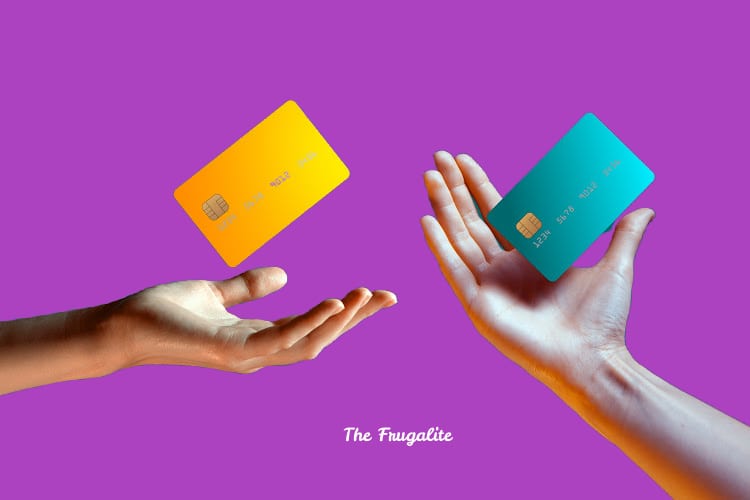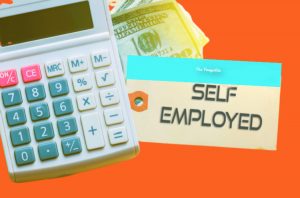(Psst: The FTC wants me to remind you that this website contains affiliate links. That means if you make a purchase from a link you click on, I might receive a small commission. This does not increase the price you’ll pay for that item nor does it decrease the awesomeness of the item. ~ Daisy)
Plastic currency is everywhere these days. It’s nearly impossible to buy anything online without using either credit cards or debit cards. And, with some countries across the globe on the verge of being completely cashless societies, it’s likely the US is right behind them. But what is plastic currency? What are the differences between credit cards and debit cards, and how is credit reported? This article will give an overview to help you on your journey to financial literacy.
Credit Cards
This type of plastic currency can be viewed as a loan. When you use credit cards to purchase items, the money has to be repaid. There is typically a limit, commonly $5000, but it can be more or less. Spending more than this limit will result in a fee if the transaction is honored, so it’s best to stay under the limit. The provider sends a bill every month. After the initial grace period, interest is assessed on any unpaid balance. Interest rates will depend on the borrower; high-risk borrowers will have higher interest rates, sometimes as high as 30%. Lower risk borrowers will have lower interest rates, in some cases as low as 8%. Risk is determined by credit history. *Please see FICO scores below.
There are legal protections in place in the case of fraudulent charges. Usually, once reported, the cardholder isn’t liable for these purchases. In some cases, the company will contact the cardholder to verify suspicious transactions. If there is such activity, the account will be frozen and a new card issued. Applying for a credit card usually involves financial disclosure and a credit check. The application will request employment and residence information and personal information, including birth date and social security number.
The Rewards Credit Card
Most common today is the rewards credit card. For each dollar spent the cardholder receives rewards such as cash, airline miles, or points towards purchases. I strongly recommend not using a card just to get the rewards! If the card balance isn’t paid off at the end of the billing cycle, the interest will more than outweigh the rewards.
The card is deliberately structured in this way so the provider makes money. Transaction fees on a typical credit card transaction is 1-3% of the total, which doesn’t add up to very much. However, unpaid balances accrue interest much more quickly, which is what the card provider wants. The financially savvy consumer doesn’t want this since it can take years literally to pay off the card.
One of the rules this writer lives by is never buy something on credit that I can’t pay off at the end of the billing cycle. Emergencies are the only exception. Rewards are icing on the cake, not a reason to have a card.
Read Daisy’s personal experience with maxed-out credit cards, no emergency fund, and little in the way of disposable income and what she did to pull herself out of that mess HERE.
Secured Credit Cards
Secured credit cards are usually given to a borrower with poor or no credit. A cash deposit is held by the card provider, which functions as the card’s limit. As the borrower makes purchases and timely monthly payments, a good credit history is built. If the borrower should default, the card is canceled, and the deposit forfeits.
For cards that act as both credit and debit cards, one can know which function is being used by what happens at the terminal. Some terminals will detect the multiple roles and ask the user to choose credit or debit. Debit card usage usually requires a personal identification number, or PIN, to be entered at the terminal. In the case of credit cards, one signs a receipt.
Debit Cards
This type of plastic currency links directly to one’s bank account. Purchases using this card are much the same as using cash. The money comes directly out of the account, so there’s no need to repay. What can be spent is limited only by the account balance, and no interest is charged. However, overdrawn accounts have stiff fees, so take care to avoid this.
Since legal protections are much less than credit cards enjoy, it’s generally unwise to use these for online transactions. If a fraudulent transaction occurs, you can challenge it. However, the money is often gone, at least until the matter is resolved. Fraudulent transactions via debit card are similar to losing money out of your pocket. (Bank account applications request the same information as outlined above, including the credit check.)
Things to be aware of in case of fraud
Criminals can be very clever people. They’ve figured out ways to steal card numbers. In some cases, right out of your wallet without ever touching the card. An RFID scanner reads the number, and a blank card can be programmed with this information.
Other ways to gain your card information are keystroke loggers and card skimmers, commonly found attached to public terminals such as gas pumps and public computer terminals. Keystroke loggers record which keys are pressed on a keyboard. Card skimmers are generally connected to the payment terminal and read the information on every card used at that terminal.
In all cases, the information is used to steal identities and make purchases, which can ruin the victim’s credit rating and is a nightmare to straighten out. IMO, one can never be too careful! I never send my payment information via any public terminal or use one to access bank or financial accounts. Cash still has its uses.
Credit Reporting/FICO scores
There are three agencies collecting credit information: Transunion, Experian, and Equifax.
Credit reports contain a ton of personal information: address history, all types of credit used, amounts, and payment history. Negative items are also recorded here, such as late payments, accounts sent to collections, and bankruptcies. The FICO score is calculated from this information. Scores range from 300-850 and the higher the number, the better your credit. Lower scores indicate a high-risk borrower. If a person with a low score can obtain credit, the interest rate will be higher to compensate the lender for the risk.
Monitoring your credit report is vital to financial health, and it’s relatively easy to do. Every consumer is legally entitled to one free report per year from each agency. Therefore, requesting one’s report at 3-4 month intervals is easy and free of charge. It’s easy to search the agencies by name and request your credit report via their website.
Why is it so vital to monitor the credit report?
Put simply: identity theft.
While every cardholder receives a monthly statement and can monitor for fraudulent charges, what about the accounts you didn’t know you had? It’s shockingly easy to obtain credit cards in another person’s name. Your credit report is where these will appear.
Identity theft is complicated to prove, but one simply cannot allow it once discovered. Identity thieves will trash your entire credit rating, which means you won’t be able to buy a house, get a car loan, or another credit card. Consider identity theft insurance, which some accounts have as a benefit.
Conclusion
Credit is a great tool that can help in an emergency. Understanding what this tool is for and what it is not for will help you maintain your financial health throughout your lifetime.
Always remember: credit is a tool, not a lifestyle. Use it wisely!
Do you use any kind of credit cards or debit cards? Do you have any personal rules for managing money with them? Share your thoughts in the comments.












2 thoughts on “What You Need to Know About Credit Cards and Debit Cards”
These two articles are current, insightful and scary:
How to Spot and Avoid Credit Card Skimmers and Shimmers, By Max Eddy,
Updated March 2, 2021
https://www.pcmag.com/how-to/how-to-spot-and-avoid-credit-card-skimmers
Plus comments!
AND
Frank Abagnale: ‘Never, ever use a debit card,’ warns fraud expert and ex-con artist—here’s what to do instead, 30 Aug 2019
https://www.cnbc.com/2019/08/27/debit-cards-are-dangerous-warns-fraud-expert-and-ex-con-artist-frank-abagnale.html
–Lewis
Several places I buy at charge you the amount they pay for the credit card use. By paying cash the extra charge is avoided.